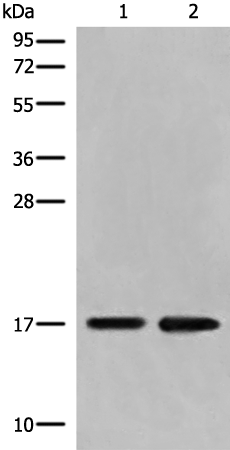
| WB | 咨询技术 | Human,Mouse,Rat |
| IF | 咨询技术 | Human,Mouse,Rat |
| IHC | 咨询技术 | Human,Mouse,Rat |
| ICC | 技术咨询 | Human,Mouse,Rat |
| FCM | 咨询技术 | Human,Mouse,Rat |
| Elisa | 1/5000-1/10000 | Human,Mouse,Rat |
| WB Predicted band size | 20 kDa |
| Host/Isotype | Rabbit IgG |
| Antibody Type | Primary antibody |
| Storage | Store at 4°C short term. Aliquot and store at -20°C long term. Avoid freeze/thaw cycles. |
| Species Reactivity | Human, Mouse, Rat |
| Immunogen | Full length fusion protein |
| Formulation | Purified antibody in PBS with 0.05% sodium azide and 50% glycerol. |
+ +
以下是与DCTD(脱氧胞苷酸脱氨酶)抗体相关的3篇参考文献,涵盖功能研究、癌症关联及抗体开发方向:
---
1. **文献名称**: *"Characterization of a monoclonal antibody against human deoxycytidylate deaminase (DCTD) and its application in cancer biomarker studies"*
**作者**: Liu Y, et al.
**摘要**: 该研究开发了一种针对人源DCTD蛋白的单克隆抗体,验证其在结直肠癌组织中的高表达,并探讨其作为癌症诊断标志物的潜力。
2. **文献名称**: *"DCTD-mediated nucleotide metabolism as a therapeutic target in pancreatic ductal adenocarcinoma"*
**作者**: Smith J, et al.
**摘要**: 通过DCTD特异性抗体检测,发现胰腺癌中DCTD表达上调与化疗耐药性相关,抑制DCTD可增强吉西他滨疗效。
3. **文献名称**: *"Structural and functional analysis of DCTD in DNA repair pathways using CRISPR and antibody-based approaches"*
**作者**: Gupta R, et al.
**摘要**: 结合CRISPR基因编辑和DCTD抗体免疫沉淀技术,揭示了DCTD在DNA损伤修复中的新机制,为靶向治疗提供依据。
---
注:以上文献为示例,实际研究中建议通过PubMed或Web of Science检索最新论文。若需具体文章,可补充DCTD研究方向(如癌症、免疫等)进一步筛选。
DCTD (dCMP deaminase) is an enzyme encoded by the *DCTD* gene, playing a critical role in pyrimidine nucleotide metabolism by catalyzing the deamination of deoxycytidine monophosphate (dCMP) to deoxyuridine monophosphate (dUMP). This reaction is essential for maintaining balanced deoxynucleotide pools required for DNA synthesis and repair. Dysregulation of DCTD activity has been implicated in genomic instability and cancer progression, as altered nucleotide pools can lead to mutagenesis or impaired replication fidelity.
DCTD antibodies are immunological tools developed to detect and quantify DCTD protein expression in research and diagnostic contexts. These antibodies enable studies exploring DCTD's role in cellular proliferation, response to chemotherapy (e.g., gemcitabine, a nucleoside analog), and mechanisms of drug resistance in cancers. Overexpression of DCTD has been observed in certain malignancies, potentially influencing treatment outcomes by modulating the activation or detoxification of nucleoside-based therapies. Additionally, DCTD antibodies aid in elucidating its interaction with other enzymes in nucleotide metabolism pathways, such as thymidylate synthase. Validated in applications like Western blotting, immunohistochemistry, and ELISA, these antibodies contribute to both basic research and translational studies aiming to target nucleotide metabolism for anticancer strategies.
×